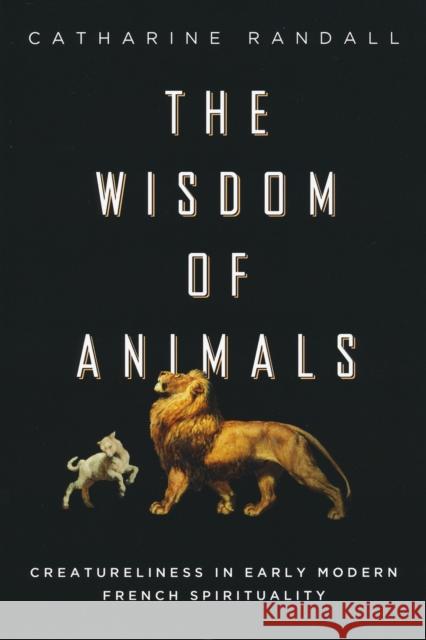Wisdom of Animals: Creatureliness in Early Modern French Spirituality » książka
Wisdom of Animals: Creatureliness in Early Modern French Spirituality
ISBN-13: 9780268040352 / Angielski / Miękka / 2014 / 190 str.
Throughout Western civilization, animals have decorated heraldic shields, populated medieval manuscripts, and ornamented baroque pottery. Animals have also been our companions, our correctives, and our ciphers as humanity has represented and addressed issues of authority, cultural strife, and self-awareness as theological, moral, and social beings. In "The Wisdom of Animals: Creatureliness in Early Modern French Spirituality, "Catharine Randall traces two threads of thought that consistently appear in a number of early modern French texts: how animals are used as a means for humans to explore themselves and the meaning of existence; and how animals can be subjects in their own right. In her accessible, interdisciplinary study, Randall explores the link between philosophical and theological discussions of the nature and status of animals vis-a-vis the rest of existence, particularly humans. In doing so, she provides the early modern backdrop for the more frequently studied modern and postmodern notions of animality. Randall approaches her themes by way of French confessional and devotional literature, especially the works of Michel de Montaigne, Guillaume Salluste Du Bartas, St. Francois de Sales, and Guillaume-Hyacinthe Bougeant. From these, she elicits contrasting perspectives of animality: rational vs. mystical, representational vs. sacramental, religious vs. secular, and Protestant vs. Jesuit Catholic perspectives. "Catharine Randall has written an informative, erudite, and convincing study of the complexity of thought concerning animals in the early modern period, and the importance of theological perspectives for that thought. "The Wisdom of Animals: Creatureliness in Early Modern French Spirituality "is an original contribution to the field, and is of potential interest not only to scholars of early modern French history and literature, but also to readers interested in religious studies, the history of animality, and the antecedents to current discussions of the status and rights of animals." --Kathleen Perry Long, Cornell University "Here is a book that breathes and inspires: terse and compelling, every page written with flair and force, "The Wisdom of Animals" reaches into the past to remind us that we are animals and that we must commit our faith to the world that, by no casual miracle, it is a gift for us to inhabit. Randall's informed and sustained readings of a panoply of early modern writers tell us, in both their words and hers, why the intricate webbings of our ecosphere must be nurtured and cherished. Weaving together literature, theology and philosophy, she affirms over and again how and why animal wisdom is vital for the present and future of our imperiled planet." --Tom Conley, Abbot Lawrence Lowell Professor of Romance Languages and Literatures, Harvard University











